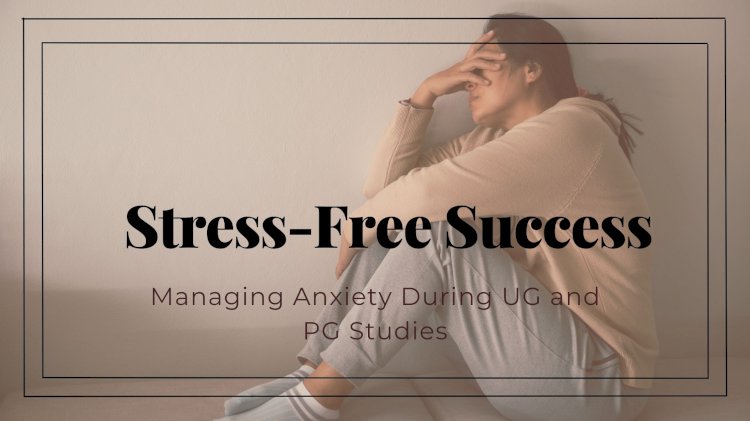Stress-Free Success: Managing Anxiety During UG and PG Studies
In the pursuit of higher education, students often encounter stress and anxiety during their UG and PG studies. To effectively tackle these challenges, time management and prioritization are crucial in organizing tasks and maintaining a healthy balance between academics and leisure activities. Establishing a consistent study routine enhances focus and reduces last-minute cramming. Seeking support from professors or counsellors helps in overcoming academic and personal obstacles. Mindfulness, meditation, regular exercise, and a balanced diet contribute to better overall well-being. Adequate sleep and limiting digital distractions also play vital roles in reducing stress. By implementing these strategies, students can navigate the academic journey with greater resilience and success.
By Shreya Rajvanshi Gangal

Entering the world of higher education can be both exciting and challenging. Pursuing undergraduate (UG) and postgraduate (PG) studies opens up new opportunities, experiences, and personal growth. However, it also brings the pressures of academic demands, social adjustments, and future uncertainties. As a result, many students struggle with stress and anxiety during these crucial years of their lives. This article will explore practical strategies to effectively tackle stress and anxiety, promoting overall well-being and academic success.
Understanding Stress and Anxiety
Before delving into coping mechanisms, it's essential to understand stress and anxiety and their impact on students' lives. Stress is the body's natural response to perceived threats or challenges, and it can manifest as physical, emotional, or mental tension. On the other hand, anxiety is a persistent feeling of worry, fear, or unease about upcoming events or uncertain outcomes.
In the context of UG and PG studies, stress can arise from various factors, such as
- Academic Pressure: The expectations of excelling in coursework, assignments, exams, and research projects can be overwhelming.
- Time Management: Balancing study, work, and personal life can create time constraints and feelings of being stretched thin.
- Social Interactions: Adjusting to a new academic environment, making new friends, and handling peer pressure can lead to anxiety.
- Future Uncertainties: Concerns about career prospects and post-graduation plans may cause stress and worry.
Effective Strategies to Tackle Stress and Anxiety
Time Management and Prioritization:
Proper time management is crucial for reducing stress and maximizing productivity. Use tools such as calendars, planners, or mobile apps to organize your tasks and commitments. Prioritize important assignments and break them down into smaller, manageable tasks. Allocating time for both academic and leisure activities can help maintain a healthy balance.
Establishing a Study Routine:
Create a consistent study routine that aligns with your natural productivity patterns. Having a structured study schedule can enhance focus and reduce last-minute cramming, which often leads to added stress.
Seeking Support:
Don't hesitate to seek help when needed. Reach out to professors, academic advisors, or counsellors if you're struggling with coursework or personal challenges. Many universities offer support services that cater to students' mental health and well-being.
Mindfulness and Meditation:
Practising mindfulness and meditation can help reduce anxiety by grounding you in the present moment. Incorporate simple breathing exercises or meditation sessions into your daily routine to calm your mind and improve focus.
Regular Exercise:
Physical activity is a powerful stress reliever. Engage in activities you enjoy, such as jogging, yoga, dancing, or playing sports. Exercise releases endorphins, the "feel-good" hormones, which can boost your mood and overall well-being.
Balanced Diet:
Maintaining a balanced diet is essential for both physical and mental health. Avoid excessive caffeine, sugary snacks, and fast food, as they can contribute to mood swings and energy crashes. Opt for nutritious foods that support brain function, such as fruits, vegetables, whole grains, and lean proteins.
Sleep Hygiene:
Adequate sleep is crucial for cognitive function and emotional well-being. Aim for 7-9 hours of sleep each night and establish a bedtime routine that helps you unwind before sleep.
Limiting Social Media and Digital Distractions:
While technology can be beneficial, excessive use of social media and digital devices can increase stress and anxiety. Set boundaries and take regular breaks from screens to promote relaxation and reduce information overload.
Engaging in Hobbies and Relaxation Techniques:
Spend time on hobbies or activities that bring you joy and relaxation. Whether it's painting, reading, playing a musical instrument, or gardening, these activities can serve as healthy outlets for stress.
Joining Supportive Communities:
Get involved in clubs, organizations, or social groups that align with your interests. Connecting with like-minded individuals can foster a sense of belonging and provide valuable emotional support.
Setting Realistic Goals:
Set achievable goals that are aligned with your capabilities and interests. Unrealistic expectations can lead to increased pressure and disappointment.
Embracing Failure as a Learning Opportunity:
Accept that setbacks and failures are a part of life. Instead of dwelling on them, view them as learning opportunities that can lead to personal growth and resilience.
Conclusion
Navigating the challenges of undergraduate and postgraduate studies can be demanding, but it's essential to recognize that stress and anxiety are normal responses to significant life changes. By implementing the strategies mentioned above, students can effectively tackle stress and anxiety, leading to improved well-being and academic performance.
Remember that seeking help when needed is a sign of strength, not weakness. Don't hesitate to reach out to friends, family, or university support services if you find yourself overwhelmed. With a combination of self-care, time management, and a positive mindset, you can confidently navigate the academic journey and emerge stronger, more resilient, and ready to embrace the opportunities that lie ahead.
What's Your Reaction?



















